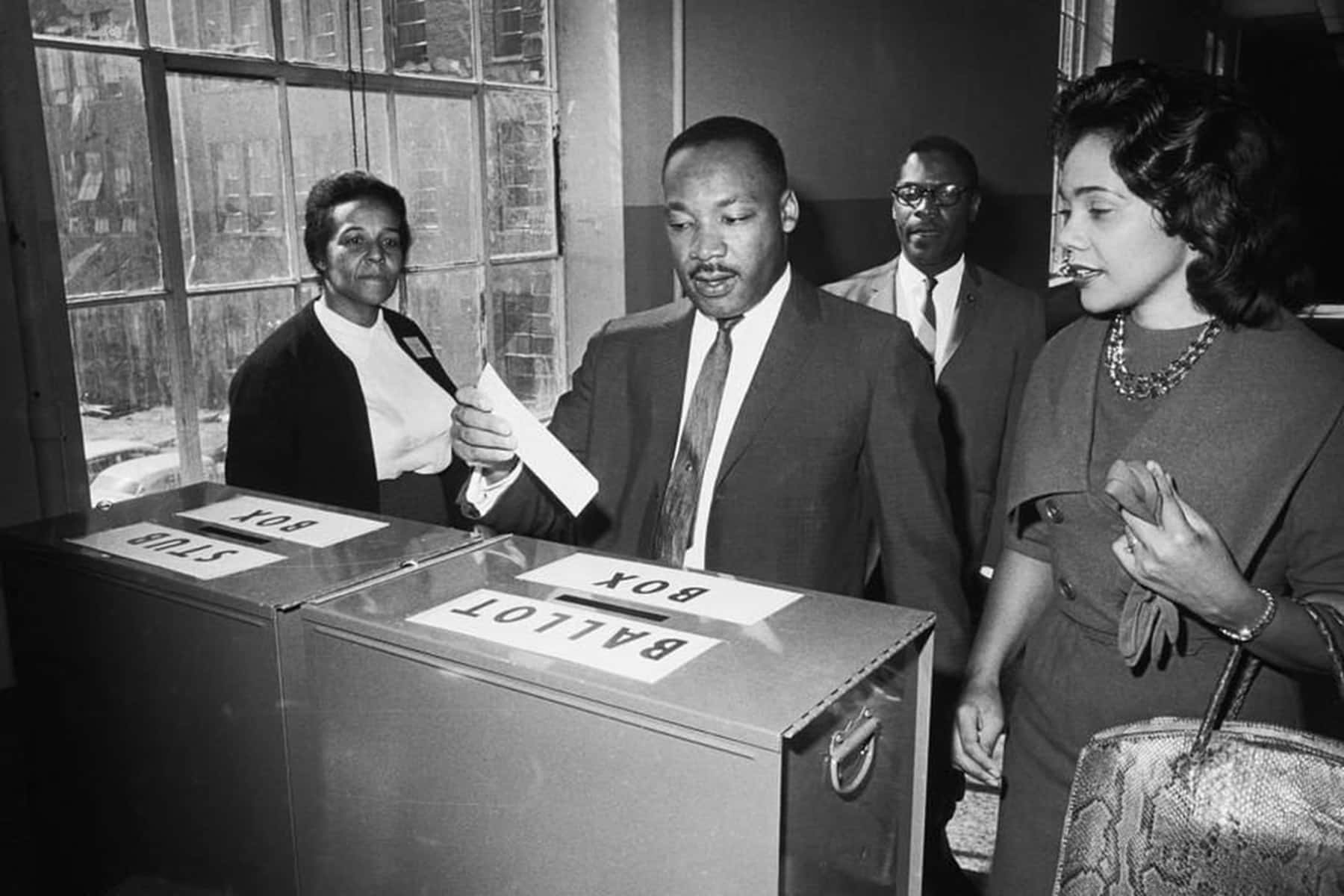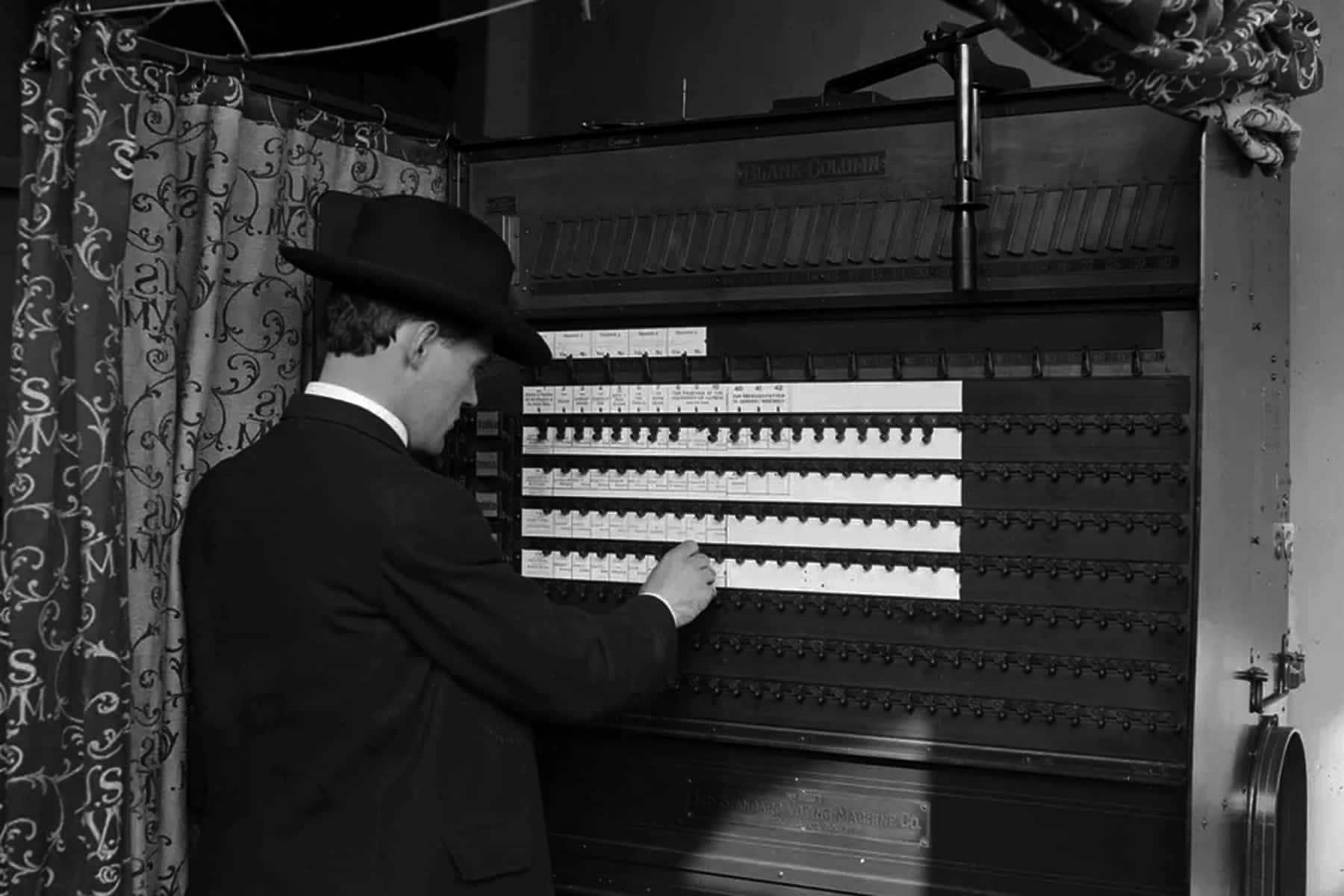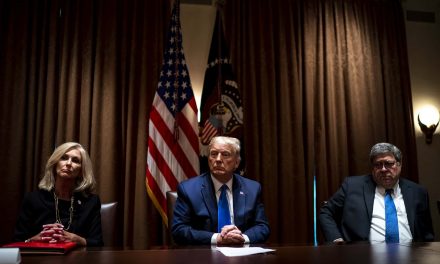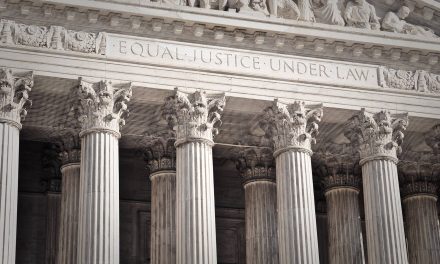
Fifty-six years ago, on August 6, 1965, President Lyndon B. Johnson signed the Voting Rights Act. The need for the law was explained in its full title: “An Act to enforce the fifteenth amendment to the Constitution, and for other purposes.”
In the wake of the Civil War, Americans tried to create a new nation in which the law treated Black men and White men as equals. In 1865, they ratified the Thirteenth Amendment to the Constitution, outlawing enslavement except as punishment for crimes.
In 1868, they adjusted the Constitution again, guaranteeing that anyone born or naturalized in the United States — except certain Indigenous Americans—was a citizen, opening up the suffrage to Black men. In 1870, after Georgia legislators expelled their newly seated Black colleagues, Americans defended the right of Black men to vote by adding that right to the Constitution.
All three of those amendments—the Thirteenth, Fourteenth, and Fifteenth—gave Congress the power to enforce them. In 1870, Congress established the Department of Justice to do just that. Reactionary White southerners had been using state laws, and the unwillingness of state judges and juries to protect Black Americans from White gangs and cheating employers, to keep Black people subservient.
White men organized as the Ku Klux Klan to terrorize Black men and to keep them and their White allies from voting to change that system. In 1870, the federal government stepped in to protect Black rights and prosecute members of the Ku Klux Klan.
With federal power now behind the Constitutional protection of equality, threatening jail for those who violated the law, White opponents of Black voting changed their argument against it.
In 1871, they began to say that they had no problem with Black men voting on racial grounds; their objection to Black voting was that Black men, just out of enslavement, were poor and uneducated. They were voting for lawmakers who promised them public services like roads and schools, and which could only be paid for with tax levies.
The idea that Black voters were socialists — they actually used that term in 1871 — meant that White northerners who had fought to replace the hierarchical society of the Old South with a society based on equality began to change their tune.
They looked the other way as White men kept Black men from voting, first with terrorism and then with state election laws using grandfather clauses, which cut out Black men without mentioning race by permitting a man to vote if his grandfather had; literacy tests in which White registrars got to decide who passed; poll taxes; and so on. States also cut up districts unevenly to favor the Democrats, who ran an all-White, segregationist party. By 1880 the south was solidly Democratic, and it would remain so until 1964.
Southern states always held elections: it was just foreordained that the Democrats would win them. Black Americans never accepted this state of affairs, but their opposition did not gain powerful national traction until after World War II.
During that war, Americans from all walks of life had turned out to defeat fascism, a government system based on the idea that some people are better than others. Americans defended democracy and, for all that Black Americans fought in segregated units, and that race riots broke out in cities across the country during the war years, and that the government interned Japanese Americans, lawmakers began to recognize that the nation could not effectively define itself as a democracy if Black and Brown people lived in substandard housing, received substandard educations, could not advance from menial jobs, and could not vote to change any of those circumstances.
Meanwhile, Black Americans and people of color who had fought for the nation overseas brought home their determination to be treated equally, especially as the financial collapse of European countries loosened their grip on their former African and Asian colonies, launching new nations.
Those interested in advancing Black rights turned, once again, to the federal government to overrule discriminatory state laws. Spurred by lawyer Thurgood Marshall, judges used the due process clause and the equal protection clause of the Fourteenth Amendment to argue that the protections in the Bill of Rights applied to the states, that is, the states could not deprive any American of equality.
In 1954, the Supreme Court under Chief Justice Earl Warren, the former Republican governor of California, used this doctrine when it handed down the Brown v. Board of Education decision declaring segregated schools unconstitutional.
White reactionaries responded with violence, but Black Americans continued to stand up for their rights. In 1957 and 1960, under pressure from Republican President Dwight Eisenhower, Congress passed civil rights acts designed to empower the federal government to enforce the laws protecting Black voting.
In 1961 the Student Nonviolent Coordinating Committee (SNCC) and the Council of Federated Organizations (COFO) began intensive efforts to register voters and to organize communities to support political change. Because only 6.7% of Black Mississippians were registered, MIssissippi became a focal point, and in the “Freedom Summer” of 1964, organized under Bob Moses (who passed on July 25 of this year), volunteers set out to register voters.
On June 21, Ku Klux Klan members, at least one of whom was a law enforcement officer, murdered organizers James Chaney, Andrew Goodman, and Michael Schwerner near Philadelphia, Mississippi, and, when discovered, laughed at the idea they would be punished for the murders.
That year, Congress passed the Civil Rights Act of 1964, which strengthened voting rights. On March 7, 1965, in Selma, Alabama, marchers led by John Lewis (who would go on to serve 17 terms in Congress) headed for Montgomery to demonstrate their desire to vote. Law enforcement officers stopped them on the Edmund Pettus Bridge and beat them bloody.
On March 15, President Johnson called for Congress to pass legislation defending Americans’ right to vote. It did. And on this day in 1965, the Voting Rights Act became law. It became such a fundamental part of our legal system that Congress repeatedly reauthorized it, by large margins, as recently as 2006.
But in the 2013 Shelby County v. Holder decision, the Supreme Court under Chief Justice John Roberts gutted the provision of the law requiring that states with histories of voter discrimination get approval from the Department of Justice before they changed their voting laws. Immediately, the legislatures of those states, now dominated by Republicans, began to pass measures to suppress the vote.
Now, in the wake of the 2020 election, Republican-dominated states have increased the rate of voter suppression, and on July 1, 2021, the Supreme Court permitted such suppression with the Brnovich v. DNC decision.
If the Republicans are allowed to choose who will vote in the states, they will dominate the country in the same way that the Democrats turned the South into a one-party state after the Civil War. Alarmed at what will amount to the loss of our democracy, Democrats are calling for the federal government to protect voting rights.
And yet, 2020 made it crystal clear that if Republicans cannot stop Democrats from voting, they will not be able to win elections. And so, Republicans are insisting that states alone can determine who can vote and that any federal legislation is tyrannical overreach. A recent Pew poll shows that more than two thirds of Republican voters don’t think voting is a right and believe it can be limited.
And so, here we stand, in an existential crisis over voting rights and whether it is states or the federal government that should decide them. Right now, there are two major voting rights bills before Congress. The Democrats have introduced the For the People Act, a sweeping measure that protects the right to vote, ends partisan gerrymandering, stops the flow of cash into elections, and requires new ethics guidelines for lawmakers. They have also introduced the John Lewis Voting Rights Act, which focuses more tightly on voting and restores the protections provided in the 1965 Voting Rights Act.
Republican senators have announced their opposition to any voting rights bill, so any law that gets through will have to get around a Senate filibuster, which cannot be broken without 10 Republican senators. Democrats could break the filibuster for a voting rights bill, but Senators Joe Manchin (D-WV) and Kyrsten Sinema (D-AZ) indicated earlier this summer they would not support such a move.
And yet, there are signs that a voting rights bill is not dead. Democratic senators have continued to work to come up with a bill that can make it through their party, and there is no point in doing that if, in the end, they know they cannot make it a law. “Everybody’s working in good faith on this,” Manchin told Mike DeBonis of the Washington Post. “It’s everybody’s input, not just mine, but I think mine, maybe… got us all talking and rolling in the direction that we had to go back to basics,” he said.
Back to basics is a very good idea indeed. The basic idea that we cannot have equality before the law without equal access to the ballot gave us the Thirteenth, Fourteenth, and Fifteenth Amendments to the Constitution, and established the power of the federal government over the states to enforce them.
Library of Congress
Letters from an Аmerican is a daily email newsletter written by Heather Cox Richardson, about the history behind today’s politics














